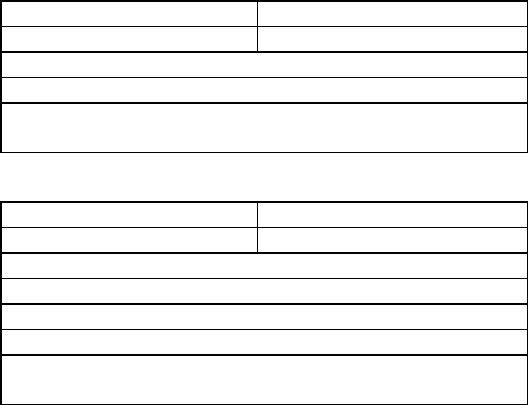
2001/10/02
CHAPTER 2 "PCL" - 73
6.1.4. User-defined pattern command
Esc*c#W [ data ] (27)(42)(99)#(87) <1Bh><2Ah><63h>#<57h>
• # should be in the range 0 ~ 32767.
• # stands for the number of pattern data bytes.
• User defined patterns can be defined by binary data or an 8 byte pattern descriptor.
• The formats for the pattern descriptor are listed below.
<For 300 dpi>
MSB LSB
0 - 1
Format (0) Continuation (0)
2 - 3
Pixel Encoding (1) Reserved (0)
4 - 5
Height in Pixels
6 - 7
Width in Pixels
8 -
Pattern Image
MSB LSB
0 - 1
Format (20) Continuation (0)
2 - 3
Pixel Encoding (1) Reserved (0)
4 - 5
Height in Pixels
6 - 7
Width in Pixels
8 - 9
X resolution
10 - 11
Y resolution X=Y: 300 or 600
12 -
Pattern Image
• A pattern which is defined at 600 dpi cannot be converted to one at 300 dpi.
• Format - set to 0 or 20.
• Continuation - set to 0.
• Pixel Encoding - set to 1.
• Height in Pixels - specifies the pattern height by the number of rows.
• Width in Pixels - specifies the pattern width by the number of pixels.
• Pattern Image - consists of the raster data for the pattern.
• X resolution - specifies the resolution in the X scan direction.
• Y resolution - specifies the resolution in the Y scan direction.
6.1.5. Set pattern reference point
Esc*p#R (27)(42)(112)#(82) <1Bh><2Ah><70h>#<52h>
• This command sets the pattern reference point to the current cursor position.
• # specifies whether the pattern rotates with the print direction or remains fixed.
• The Pattern reference point should be placed on a physical page and the base pattern is positioned at the
pattern reference point for tiling.


















